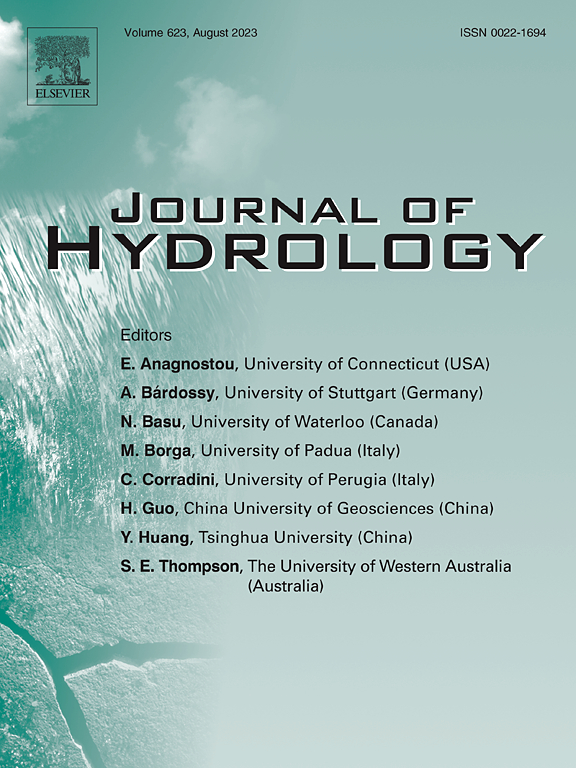Ensemble modeling of the two-dimensional stochastic confined groundwater flow through the evolution of the hydraulic head’s probability density function
IF 6.3
1区 地球科学
Q1 ENGINEERING, CIVIL
引用次数: 0
Abstract
Groundwater storage in aquifers has become a vital water source due to water scarcity in recent years. However, aquifer systems are full of uncertainties, which inevitably propagate throughout the modeling computations, mainly reducing the reliability of the model output. The fundamental science problem this study addresses is the development of a two-dimensional stochastic confined groundwater flow model, which determines the time–space evolution of the ensemble mean and ensemble variance of the flow field over a model domain under uncertain parameters and uncertain sink/source conditions. This is achieved by linking the stochastic partial differential equation that governs the confined aquifer flow to a non-local Lagrangian-Eulerian extension to the Fokker-Planck equation (LEFPE). In the form of the LEFPE, the resulting deterministic governing equation describes the spatio-temporal evolution of the probability density function of the state variables in the confined groundwater flow process by one single numerical realization instead of requiring thousands of simulations in the Monte Carlo approach. As will be shown in the paper’s text, the time–space evolving ensemble mean and ensemble variance of the flow process are then obtained from the pdf of the state variable (hydraulic head) of the process that is determined from the solution of the LEFPE of the process under specified initial and boundary conditions. As such, in the developed methodology, no assumption is made on the distribution of the time–space varying pdf of the flow process, which is obtained from the solution of the LEFPE of the process under specified initial and boundary conditions. Consequently, the groundwater flow process’s mean and standard deviation behavior can be modeled under uncertainty in the transmissivity field and recharge and/or pumping conditions. In addition, an appropriate numerical method for LEFPE’s solution is subsequently devised. Then, its solution is presented, discussed, and illustrated through a numerical example, which is compared against the results obtained by means of the Monte Carlo simulations. Results suggest that the proposed model appropriately characterizes the time–space evolving ensemble mean and variance the ensemble behavior in confined groundwater systems under uncertainty in the transmissivity field.
基于水头概率密度函数演化的二维随机承压地下水流集成建模
近年来,由于水资源短缺,地下蓄水层已成为重要的水源。然而,含水层系统充满了不确定性,这些不确定性不可避免地会传播到整个建模计算中,这主要降低了模型输出的可靠性。本研究解决的基本科学问题是建立一个二维随机承压地下水流动模型,该模型确定了在不确定参数和不确定汇源条件下流场集合均值和集合方差在模型域上的时空演化。这是通过将控制承压含水层流动的随机偏微分方程与Fokker-Planck方程(LEFPE)的非局部拉格朗日-欧拉扩展联系起来实现的。以LEFPE的形式,所得到的确定性控制方程通过一个单一的数值实现来描述承压地下水流动过程中状态变量的概率密度函数的时空演变,而不是像蒙特卡罗方法那样需要数千次模拟。如本文所示,在给定的初始条件和边界条件下,由过程的LEFPE解确定的过程状态变量(水头)的pdf,得到流动过程的时空演化系综均值和系综方差。因此,在所开发的方法中,没有对流动过程的时空变化pdf的分布进行假设,该pdf是由过程的LEFPE在指定的初始条件和边界条件下的解获得的。因此,地下水流动过程的均值和标准差行为可以在不确定的透过率场和补给和/或抽水条件下建模。此外,还设计了求解LEFPE的合适数值方法。然后,给出了其解,并进行了讨论,并通过一个数值例子进行了说明,并与蒙特卡罗模拟的结果进行了比较。结果表明,该模型较好地表征了时空演化的系综均值,并对不确定性下承压地下水系统系综行为进行了方差分析。
本文章由计算机程序翻译,如有差异,请以英文原文为准。
求助全文
约1分钟内获得全文
求助全文
来源期刊

Journal of Hydrology
地学-地球科学综合
CiteScore
11.00
自引率
12.50%
发文量
1309
审稿时长
7.5 months
期刊介绍:
The Journal of Hydrology publishes original research papers and comprehensive reviews in all the subfields of the hydrological sciences including water based management and policy issues that impact on economics and society. These comprise, but are not limited to the physical, chemical, biogeochemical, stochastic and systems aspects of surface and groundwater hydrology, hydrometeorology and hydrogeology. Relevant topics incorporating the insights and methodologies of disciplines such as climatology, water resource systems, hydraulics, agrohydrology, geomorphology, soil science, instrumentation and remote sensing, civil and environmental engineering are included. Social science perspectives on hydrological problems such as resource and ecological economics, environmental sociology, psychology and behavioural science, management and policy analysis are also invited. Multi-and interdisciplinary analyses of hydrological problems are within scope. The science published in the Journal of Hydrology is relevant to catchment scales rather than exclusively to a local scale or site.
 求助内容:
求助内容: 应助结果提醒方式:
应助结果提醒方式:


